
Ashraf-us Sawaneh falls into the category of hagiographies of men of God that became current in Urdu after the introduction of printing, with the difference that it was an authorised biography written during the lifetime of its subject and actually supervised and occasionally corrected by him. The writer, Khwaja Azizul Hasan Ghouri, was among Thanvi’s akabir khulafa (prominent khalifas who were allowed to make mureeds on the maulana’s behalf). Besides, Ghouri was a graduate from Aligarh (he is particular in writing ‘Alig’ in brackets after his name) and had served the colonial administration as a deputy-collector and an inspector of schools in UP. Not only is his name adorned by a curious title ‘Khusrav-e-bargah-e-Ashrafia’ (meaning he was to Thanvi what Amir Khusrau was to Hazrat Nizamuddin Aulia), one is amused by the strangest combination of his official title of ‘Khan Bahadur’ with what appears to be his takhallus (or poetic pen-name) ‘Majzoob’. A Sufi term derived from the Arabic ‘jazb’, which means to be absorbed in or fatally attracted to the Almighty, a majzoob would perhaps be looked at as a rare bird among the worldly wise men who managed to earn titles such as ‘Khan Bahadur’ from the British colonial masters.
This particular brand of biographies is characterised, among other things, by the prominent place enjoyed in them by predictions and dreams of apparently semi-divine personalities that one would doubt or question at one’s peril. According to Ghouri, who quotes Thanvi on this, the latter’s maternal grandmother complained to a majzoob that her daugther’s male children did not survive infancy. He enigmatically replied that they died because of a tug of war between Hazrat Umar (RA) and Hazrat Ali (RA), and advised, “Ab ki bar Ali ke supurd kar dena, zinda rahe ga”, (“this time hand over the newborn to Ali and he’ll survive”). It was taken to mean that since the paternal side of Thanvi was Farooqi and the maternal side was Alavi, and the male infants were named in the former’s tradition (such as Fazl-e-Haq), hence, the male infant mortality. The next time the newborn was to be given a name with ‘Ali’ in it.
The majzoob laughed at the correct interpretation of his utterance and predicted that the mother would give birth to two sons in succession, both of whom would survive, and instructed that they were to be named Ashraf Ali and Akbar Ali, respectively. The prediction came true and the sons were named as advised. The paternal side, however, insisted on giving a name of their own to Ashraf Ali, and named him Abdul Ghani, though the latter did not gain currency. It was, incidentally, used much later by Thanvi himself as a cover in one of his risalas (titled Khutoob-ul Muziba) that he wrote as a reply to his younger brother Akbar Ali, who had objected to Ashraf Ali taking a second wife (much younger to him) while his first, older wife was still alive. It appears that under the influence of the Protestant ethics, made current by the colonial rule, polygamy had begun to be openly objected to.
Ashraf Ali was born in Thana Bhavan (hence his adopted surname ‘Thanvi’), a UP qasbah or small town some 150 kilometre from Delhi, in 1863, i.e., a mere five years after the last Mughal lost his nominal place in the Red Fort. By that time, the traditional system of the Shahi or Nawabi patronage of the maulvis (and others calling themselves ahl-e-kamal) had been all but dismantled. The primary occupation of Thanvi’s father, Abdul Haq, was to serve a tiny state in Meruth (Meerut) as its Mukhtar-e-Aam, but with the permission of his employer he used to take contracts of the commiserate from which he had earned considerable amount of wealth and social status and bought a lot of semi-urban property. Abdul Haq, therefore, belonged to the profession of thekedar, or contractor, which became the source of ‘new money’, especially from the later part of the 19th century onwards.
Ghouri quotes Thanvi while speaking about the Firasat-e-Khudadad or the God-gifted wisdom of Abdul Haq. In that, he decided very early in their childhood, what course the lives of his two sons were going to take. Ashraf Ali was chosen for taleem-e-arabi (‘Arabic education’), while Akbar Ali was to acquire taleem-e-angrezi (‘English education’). An old aunt of Thanvi took it as discrimination against the elder son that he was being deprived of the modern education, as she thought the ‘Arbaic education’ would limit his chances of earning money. Abdul Haq got enraged and said, “Bhabi sahiba, tum kehti ho ko yeh arabi parrh kar khayega kahan se. Khuda ki qasam, jis ko tum kamane-wala samajhti ho, aise aise is ki jutiyon se lage lage phirain ge.”
Published in The Express Tribune, September 17th, 2011.
COMMENTS (8)
Comments are moderated and generally will be posted if they are on-topic and not abusive.
For more information, please see our Comments FAQ



















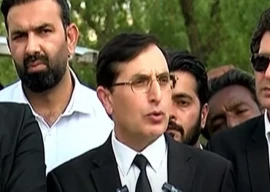
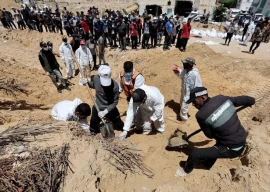
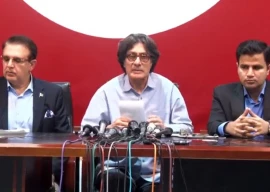

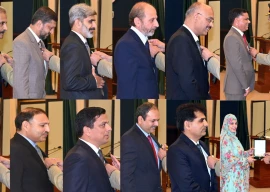










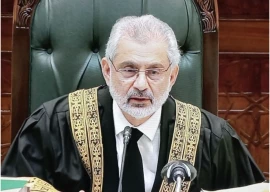







@ Jameel I allways ask one thing when ever i met some so called mullah what ever his maktabah or masalike is by the way this maktabah things only exist in india pakistan well my questian is if all makatibs can pray even shia and sunnis together in Kabbah Makah Mukaramh why we cant live peacefully in india pakistan????
@Ali Tanoli:
Then it may interest you to know what the ideas of Maulana Qasim Nanutwi founder of Darul Aloom Deoband were;
http://www.youtube.com/watch?v=Nfde2WGvf3w
It would be nice if all the terms and quotes in Persian/Arebic/Urdu are translated in Urdu for those who don't understand it. I think you take it for granted that readers are familiar with these languages, particularly Urdu which may not be the case.The last quote is an example.
Some interesting and very relevant observations have been made by Dr Mubarak Ali and Dr. Tahir Kamran in their recent presentations;
Tracing the Roots of Religious Extremism - Dr. Mubarak Ali
Tracing the Roots of Religious Extremism: Dr. Tahir Kamran
Dear Auther, After 1857 india freedom war muslims of india realized whats going on with them then they build it two institutions its called Aligarh unversity and Deoband Madrassa these two institutions provided good education to north indian peoples and saved then from many fitnahs of time and with many others well known peoples one is Maulana Ashref ali thanvi Elleh rahmah the great tafseer ul quran writer and respected in muslim world.
@Tight: No, it's not concluded yet. Perhaps this should be mentioned at the end of the article.
nice effort to present maulvi in a respectable way and to show that the word maulvi has been symbol of high honour.